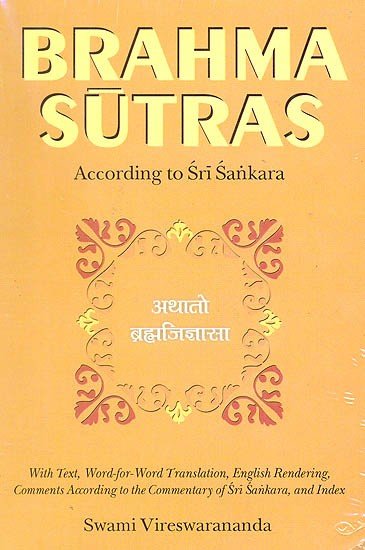Brahma Sutras (Shankara Bhashya)
by Swami Vireshwarananda | 1936 | 124,571 words | ISBN-10: 8175050063
This is the English translation of the Brahma-sutras including the commentary (Bhashya) of Shankara. The Brahma-sutra (or, Vedanta-sutra) is one of the three canonical texts of the Vedanta school of Hindu philosophy and represents an early exposition the Vedantic interpretation of the Upanishads. This edition has the original Sanskrit text, the r...
Chapter II, Section III, Adhikarana XVI
Adhikarana summary: The soul in its activity is dependent on the Lord
Brahma-Sutra 2.3.41: Sanskrit text and English translation.
परात्तु तच्छ्रुतेः ॥ ४१ ॥
parāttu tacchruteḥ || 41 ||
parāt—From the Supreme lord; tu—but; tat—that (agency); śruteḥ—so declares the Sruti.
41. But (even) that (agency of the soul) is from the Supreme Lord; so declares the Sruti.
The agency of 'che soul is also due to the Supreme Lord. The soul does good and bad deeds, being so directed by the Lord. “He makes those whom He will raise do good deeds” (Kau. 3. 8). It is through His giace that the soul attains to Knowledge and becomes free.
Brahma-Sutra 2.3.42: Sanskrit text and English translation.
कृतप्रयत्नापेक्षस्तु विहितप्रतिषिद्धावैयर्थ्यादिभ्यः ॥ ४२ ॥
kṛtaprayatnāpekṣastu vihitapratiṣiddhāvaiyarthyādibhyaḥ || 42 ||
kṛtaprayatna-apekṣaḥ—Depends on works done; tu—but; vihita-pratiṣiddha-avaiyarthyādibhyaḥ—on account of the relevancy of injunctions and prohibitions etc.
42. But (the Lord’s making the soul act) depends on works done (by it); (thus only would) injunctions and prohibitions etc. be relevant.
This Sutra refutes a possible doubt that since the Lord makes some persons do good and others evil, He must be cruel and whimsical. It says, that the Lord always directs the soul according to its good or bad deeds in previous births. And Samsara being without beginning, there will always be previous births, with actions done in them, for the guidance of the Lord. So He cannot be accused of being cruel and whimsical. It is thus alone that the scriptural injunctions and prohibitions can have any meaning; for otherwise the Jiva will gain nothing by observing these injunctions.
This does not however mar the independence of the Lord, though it may be said that since He depends on the acts of the soul, He is not free to do what He likes; for a king who presents or punishes His subjects according to their acts does not cease to be a sovereign thereby.
